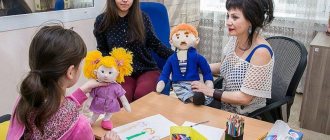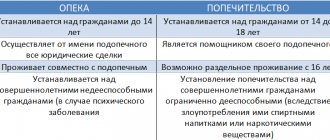Home / Guardianship / Rights and obligations of guardians and trustees
There are many misconceptions about the rights and responsibilities of guardians.
Some believe that the relationship between a guardian and a ward is practically no different from the relationship between parents and a child, while others believe that the appointment of guardianship is simply a formality.
In this article we will look at what rights and powers the legislation of the Russian Federation gives to guardians and trustees, what responsibilities it imposes on them, as well as responsibility for abuse of rights and failure to fulfill duties in relation to the child in their care.
Expert opinion
Semyon Frolov
Lawyer. 7 years of experience. Specialization: family, inheritance, housing law.
The main legislative act that regulates these legal relations is Federal Law No. 48 “On Guardianship and Trusteeship”, in particular, the rights and obligations of the guardian are regulated by Art. 10, Article 15 of the Federal Law No. 48, as well as certain provisions of the Family (Article 146, Article 148.1 of the RF IC) and Civil (Article 35, Article 36 of the Civil Code of the Russian Federation) codes of the Russian Federation, and other legislative acts.
What rights does a guardian have?
It can be said that the rights of a guardian in relation to a ward are similar to parental rights in relation to a child. Exception: material rights (material interest in paid guardianship) and the absence of the right to dispose of the property of the ward.
Basic rights:
- educate the ward, take care of his development - physical, mental, spiritual;
The main right of a guardian is to raise a child, freely choosing methods and methods of education. However, if the ward came into the care of a family at a conscious age, coercion to accept or observe the faith, philosophy or beliefs of the guardian is unacceptable.
- act on behalf of the ward, protecting his legal rights and interests;
- represent the ward in the courts, government agencies and non-governmental organizations,
- help maintain relationships with relatives
Maintaining close relationships with relatives is the child’s right (according to Article 55 of the RF IC).
However, by allowing the child to see and communicate with relatives, the guardian has the right to decide how useful this is for the ward. He has the right to independently establish the order, duration, and place of meetings of the child with his relatives, guided by the interests of the ward.
For example, it is not the responsibility of the guardian to organize meetings and deliver the child to another locality. Relatives, including parents, must themselves express their desire and take measures to spend time together with the child.
- demand the return of the ward from groundless or illegal detention by strangers, relatives and even parents,
- receive remuneration (for paid guardianship),
If paid guardianship has been appointed, the guardian has the right to receive monetary compensation for performing his duties. The amount and procedure for payment of remuneration is established by local legislation and is specified in the agreement that the Guardianship and Trusteeship Authority concludes with the guardian. The remuneration in the form of monthly payments goes to his personal bank account.
- apply for accrual and receive benefits, benefits, payments and material assistance (vouchers, gifts) in the name of the ward.
The guardian family is not entitled to receive maternity capital.
- take all measures to protect and preserve the property of the ward, his valuables;
- demand compensation for harm caused to the ward.
What are guardians not entitled to?
The duties of a guardian do not include:
- dispose of the child’s property without the permission of the guardianship and trusteeship authority.
The ward does not acquire ownership rights to property belonging to the guardian, and the guardian does not become the owner of the ward’s property.
Thus, the guardian does not have the right to enter into agreements on the transfer of the ward’s property for hire, rent, free use, as a pledge, agreements on the alienation of the ward’s property, agreements that entail the loss of ownership rights or a decrease in the value of his property.
The exception is cases of transfer of the ward's property for use for a period of more than 5 years with the prior permission of the guardianship and trusteeship authority, if such a transaction is beneficial to the ward himself.
- draw up material transactions with the ward.
An exception is made for transactions according to which the property of the guardian is transferred as a gift or gratuitous use to the ward.
- receive cash loans or credits on behalf of the ward.
The exception is cases when obtaining a cash loan or credit is necessary to support a ward or purchase residential premises for him. In this case, it is necessary to obtain prior permission from the Guardianship and Trusteeship Authority.
- spend the ward’s funds contrary to his interests.
We are talking about sums of money that are paid to the ward in the form of alimony, pensions, benefits and other social benefits.
- interfere with the maintenance of relationships between the ward and his relatives.
The exception is cases when relationships and meetings with relatives are contrary to the interests of the child.
In addition to the above restrictions, the Guardianship and Trusteeship Authority may establish additional restrictions that the guardian does not have the right to violate, or specify additional requirements - in the interests of the ward child. For example, a ban on changing the child’s place of residence or applying certain educational measures.
Requirements for candidacy by guardianship and trusteeship authorities
In order to become an adoptive parent for a child who is no longer being raised in the family of his natural mother and father, he must undergo a number of checks from the guardianship and trusteeship authorities. Often, the closest relatives most often apply for the role of guardian: grandparents, aunts or uncles, older adult brothers or sisters. But it also happens differently, a stranger becomes a trustee who decides to give the child a home and love.
- In order to give a child a home, love and care, it is not enough to just want it, it is necessary to meet the following requirements from the guardianship and trusteeship authorities:
- Be a legally competent adult citizen of the Russian Federation.
- Have permanent employment and a stable income.
- Have not previously been deprived of parental rights. The statute of limitations does not matter.
- Approach moral education, be responsible and reliable for your ward.
- The guardian must himself express a desire to take responsibility for raising a particular child.
- If you have a criminal record, it must be expunged at the time of application to become a guardian.
- Do not have alcohol or drug addiction.
In order to be able to apply for the role of a guardian or trustee, you must provide the following documents to the relevant authorities:
- Candidate Statement;
- An autobiography is compiled, which briefly indicates the last name, first name and patronymic, nationality, date of birth, residential address, education, place of birth, place of work and marital status.
- A certificate of employment for the last year or a declaration of income is provided.
- Confirming document about the availability of living space. This may be a certificate of home ownership or an extract from the house register.
- If there is a spouse, marriage registration certificate and his/her written consent to adoption.
- A state-issued conclusion from a medical institution on health status.
- In some cases, you may need a reference from your place of work drawn up in a special form.
- Certificate of no criminal record.
- Copy and original passport.
For convenience, you need to make an additional package of documents, which will contain copies of the submitted papers.
The application requires the following information:
- from whom the application was made;
- to which organ and to whom;
- passport series and number;
- candidate's residential address;
- drawn up with a request to appoint a specific child as a guardian;
- the place of work and a brief description of job responsibilities are indicated;
- who lives together;
- what kind of relationship does the future guardian have with the prospective pupil;
- The date of drawing up the application and the personal signature of the candidate are indicated.
What responsibilities does a guardian have?
The main responsibilities that are assigned to the guardian in relation to the ward, and which are aimed at protecting the rights and legitimate interests of the ward:
- support the ward.
Perhaps the main duty of a guardian is to provide the child entrusted to his care with everything necessary for full growth and development: food, clothing and shoes, school supplies, medicines.
The guardian does not spend his own funds to support the child: money from the local budget is transferred to his target cash account.
In addition, depending on local legislation, the guardian must apply for the child's payments and benefits, benefits, and free food.
- represent and protect the interests of the child.
The guardian has not only the right, but also the obligation to act on behalf of the child under his guardianship, visit government agencies and non-governmental organizations, defend the legal rights and represent the interests of the child under his guardianship.
To do this, he has the right to file lawsuits, complaints, petitions to protect the rights and interests of the ward.
- protect the ward's property rights
After the appointment of guardianship, the child does not lose ownership of all property belonging to him: real estate, vehicles, equipment, etc. The guardian does not acquire ownership rights to the property of the ward, and the ward does not have the right to claim the property of the guardian.
The guardian has the responsibility to control the use, monitor the safety and integrity of the property, and prevent a decrease in the value of the ward’s property. It is permissible to dispose of the property of a ward (sell, rent out or transfer for free use) only with the permission of the Guardianship and Trusteeship Authority.
If the child’s property rights are violated, the guardian is obliged to file claims in court for recognition of property rights, reclaiming the ward’s property from someone else’s illegal possession, etc.
The same applies to the amounts of money that the child receives: alimony, pension, social benefits. It is permissible to dispose of these funds exclusively in the interests of the ward. And if the receipt of funds stops (for example, due to the fault of the child’s parents, alimony debt arises), the guardian is obliged to take measures to resume payments and collect the debt.
The guardianship and trusteeship body monitors how the duties of the guardian are fulfilled to protect the material interests of the ward. For this purpose, the guardian must submit an annual report on the financial situation of the ward (on the list and value of property owned by him, on the amount of money received at his disposal, on expenses incurred).
- live with the ward
The guardian and the ward child must live together.
At the same time, a representative of the Guardianship and Trusteeship Authority regularly checks the living conditions at the place of residence: the number of residents, equipment, cleanliness and tidiness, availability of food. Based on the results of each inspection, a report is drawn up.
Separate living is allowed only after the child reaches 16 years of age - with the permission of the Guardianship and Trusteeship Authority.
In order to protect the housing rights of the ward, the guardian must file petitions for the provision of residential premises to the ward, claims for the move-in or eviction of unauthorized persons who do not have the right to live in the residential premises belonging to the child, etc.
- take care of the patient's health
The guardian must maintain a decent standard of living for the ward, monitor his well-being and physical development.
If the ward is a disabled child, the guardian must be informed in advance of his special needs and express a willingness to care for the ward's health.
If a child is injured or ill, the guardian is obliged to contact a medical institution and take measures to receive timely and complete medical care.
If intentional or careless harm is caused to the child’s health, the guardian must submit claims for compensation for harm to health, compensation for material costs of treatment and moral damage caused to the ward.
In addition, starting from 2010, there is a requirement for an annual mandatory medical examination of wards, which includes: examination by specialists, research and analysis, and ultrasound diagnostics.
- promote education
The child must receive complete secondary education. The guardian has the responsibility to provide the child with every opportunity to receive an education:
- choose a form of education (taking into account the child’s abilities and developmental characteristics)
- choose an educational institution,
- provide the child with textbooks, notebooks, stationery,
- provide the child with a place to prepare independently,
- monitor your child’s attendance at classes and completion of assignments,
- monitor the child's behavior.
The fulfillment by the guardian of all duties assigned to him by law is controlled by the Guardianship Authority.
Property rights
The guardian may use the movable and immovable property of the ward with the permission of the guardianship and trusteeship authorities. The transactions made must benefit the person under guardianship. The following actions are strictly prohibited:
- Personally or on behalf of the ward, draw up an agreement on the use of the property of the ward for a period of 5 or more years.
- Conclude transactions for the alienation or provision of property of the ward for free use.
- Take out a loan secured by the property of a person under guardianship.
Liability of guardians
For actions or inactions committed, the guardian bears material, administrative, and criminal liability in the manner established by the laws of the Russian Federation.
As a rule, guardians are held accountable for the following violations:
- for failure to fulfill duties towards the ward;
- for unlawful actions of the ward.
For failure to fulfill duties
For actions or inactions directed against the rights and interests of the ward, the guardian risks incurring administrative or criminal liability, depending on the nature and severity of the offense.
- For improper fulfillment of responsibilities for the upbringing and maintenance of a ward , administrative liability arises as provided for in paragraph 1 of Art. 5.35 Code of Administrative Offenses of the Russian Federation (fine from 100 to 500 rubles).
- For obstructing the child's meetings and relationships with relatives and parents , for failure to comply with a court decision to determine the child's place of residence, for concealing the child's location - administrative liability arises in accordance with clause 2 of Art. 5.35 Code of Administrative Offenses of the Russian Federation (fine from 2000 to 5000 rubles).
- For transactions on behalf of the ward or using the ward’s property , financial liability (compensation for damage) arises.
- Damage to the property of the ward also results in financial liability (compensation for damage).
- For committing a crime against a ward (use of physical violence, leaving in danger, assault on sexual integrity and other crimes) - criminal liability occurs in accordance with the general procedure in accordance with the provisions of the Criminal Code of the Russian Federation, as well as termination of guardianship and trusteeship.
For the actions of the ward
If a ward under 16 years of age causes damage to someone else's property, financial responsibility (compensation for damage) rests with the guardian.
If damage to someone else's property is caused by a ward over 16 years of age, he personally bears administrative or criminal liability (if his act contains signs of an offense or crime). Financial responsibility for compensation for damage rests with the guardian.
What is the difference between guardians and trustees?
The essence of guardianship and trusteeship is to care for the ward and protect his interests. The voiced forms of patronage differ only in some points:
- A guardian is appointed for minors under 14 years of age and incompetent citizens. He is obliged to act on behalf of the ward in all legally significant matters (choose a medical and educational institution, participate in court hearings, pay for services).
- A guardian is required for children from 14 to 18 years of age and partially incapacitated people. The duties of the representative of the guardianship authorities include monitoring the observance of the rights of the ward and protecting his interests. From the age of 16, the person under guardianship has the right to ask to live separately. If a teenager or partially incapacitated citizen wants to sell his property, he must obtain the approval of a trustee. Both parties will be involved during the transaction.
Results. From a lawyer
So, as we see, every right that a guardian is endowed with is countered by responsibilities, and responsibility is assumed for failure to fulfill the obligations assigned to him.
For example, a guardian has the right to independently choose methods of upbringing and forms of education for the child. At the same time, he is entrusted with the responsibility to provide the ward with the opportunity to receive an education. Otherwise, he will be held liable for abuse of rights or failure to fulfill duties, according to the law.
Any unlawful actions or inaction of the guardian that violate the legal rights of the child (such as abuse of rights, spending the ward’s money for extraneous purposes, disposing of the ward’s property contrary to his interests) can be appealed by the child’s relatives or parents to the Guardianship and Trusteeship Authority.
If the guardian does not obey the decision or order of the Guardianship and Trusteeship Authority, his actions or inaction may be appealed in court.
After repeated administrative prosecution for improper performance of duties, the Guardianship Authority may remove the guardian from performing duties.
Expert opinion
Dmitry Nosikov
Lawyer. Specialization: family and housing law.
Perhaps you need legal assistance in protecting the legal rights of a child under guardianship, in bringing the guardian to justice, or, conversely, in protecting the rights of the guardian from interference by outsiders.
Legislation is changing too quickly, and citizens who are engaged in important and responsible work - caring for a child - may not have time to understand legal conflicts. In this case, you can contact us for free legal advice. Attention!
- Due to frequent changes in legislation, information sometimes becomes outdated faster than we can update it on the website.
- All cases are very individual and depend on many factors. Basic information does not guarantee a solution to your specific problems.
That's why FREE expert consultants work for you around the clock!
- via the form (below), or via online chat
- Call the hotline:
- Moscow and the Region
- St. Petersburg and region
- FREE for a lawyer!
By submitting data you agree to the Consent to PD Processing, PD Processing Policy and User Agreement.
Anonymously
Information about you will not be disclosed
Fast
Fill out the form and a lawyer will contact you within 5 minutes
Tell your friends
Rate ( 1 ratings, average: 5.00 out of 5)
Author of the article
Irina Garmash
Family law consultant.
Author's rating
Articles written
612
Application example
To avoid mistakes, lawyers advise you to familiarize yourself with generally accepted sample statements. If you wish to become a child's guardian, the following form will be useful:
If we are talking about guardianship of an incapacitated citizen, then you will need to write a slightly different statement:
Consequently, a guardian is a citizen who wishes to take on the responsibilities of caring for an incapacitated person or child. He is appointed by the guardianship and trusteeship authorities. The candidate must be a healthy, capable adult citizen of the Russian Federation who has his own housing that meets all the criteria and an official income. An application is submitted about the desire to fulfill the guardianship duty to the employees of the PLO at the place of residence.







